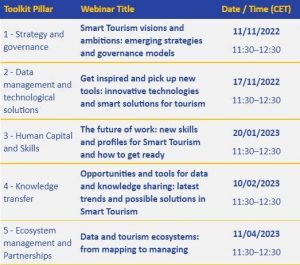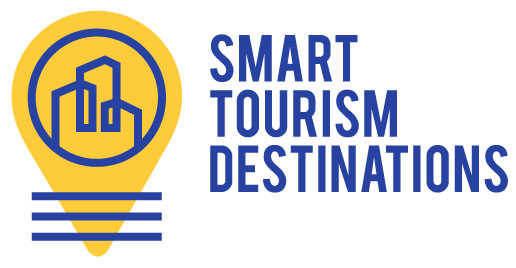The webinar developed the second pillar of the Smart Tourism Destination Project (Data collection, management, and technological solutions) through the intervention of two experts: first through the presentation prepared by Mirko Lalli, founder and CEO of the Data Appeal Company, on the topic “How to be a data driven destination: all about data! Sources, collection and values”. Then, Dario Bertocchi, assistant professor of geography at the University of Udine and adjunct professor in IT Tourism at the university of the Ca’ Foscari, made a presentation about “Data management: From Excel to dashboards and observatories”. The end of the webinar was dedicated to a Q&A session for the webinar participants.
How to be a data driven destination: all about data! Sources, collection and values
Mirko Lalli, Data appeal Company
Mirko Lalli reminded all participants that in general, only 27% of the data collected is actually used to create value. There is a lack of knowledge to actually use the data collected for something that can support decision making. He highlighted the increment of statistical data that is coming into the tourism sector, such as from online bookings for example, that would reach 74% online, and 25% from mobile phone bookings before 2026. The expert highlights, in addition, that in case one has a “data dilemma”: this is to say questions about which kind of data one should use, the most important, instead of focusing too much on big data, is to first of all start to change one’s mindset and commence with more “little data”. This little data can be internal data, or free source data for example that might be easier to use in the first instance.
Mirko Lalli then describes five steps to follow in order to be more data-driven:
- Big data is better than small data, but small data is better than no-data.
- Everything is tourism (holistic approach)
- Not everything is directly measurable
- … but you can find a proxy for what is not
- Be simple and actionable
Data management: From Excel to dashboards and observatories
Dario Bertocchi, University of Udine & University of Ca’ Foscari
Bertocchi referred back to the first speaker about the high quantity of data that can be collected, that then needs to be arranged and presented to become actionable tools providing relevant information for a data-driven approach. The speaker explained that there are different sources and typologies of information from multiple dashboards and datasets. Bertocchi then presented some of the best practices to extract some values from the data. Microsoft Excel is a good starting point according to him, as it permits inserting a large quantity of data and in addition provides support visualisation to extract some valuable information. There is also the spatial data that can be added to integrate spatial dimensions to the data description: such as different scales (regions, municipality, etc.). Bertocchi then recommended some software that can provide good integration and visualisation tools for data: Power Bi, a free tool from Microsoft, or Data Studio and Tableau. They are quite simple to use to interrogate some statistical data that one can find or data from excel files. They are also useful to communicate information to different stakeholders about one’s performance and tool sets. However, the speaker emphasised the issue of creating a lot of dashboards but then not being able to generate effective value through the obtained visualisations. He then presented the example of the city of Venice in Italy and its control room to explain which data can be collected and how it can be useful: in order to monitor better tourism flows and overcapacities in the city centre of the city, it has been decided to create this sort of observatory that is working on the data collection and analysis. The control room of Venezia is using different sources of data: the one of cameras, that are giving indications on the most important flux sense, for example, or the data collections from mobile phones to understand where people are coming from (national or international provenance) and how much time they are staying (day trip or more).
The speakers at the event were:
- Mirko Lalli : founder and CEO of the Data Appeal Company. He is also a teacher.
- Dario : assistant professor of geography at the University of Udine and adjunct professor in IT Tourism at the university of Ca’ Foscari.
- Costanza Bersani: project manager and moderator of the webinar, Intellera consulting

Find out more by downloading the EU guide on data for tourism destinations which is available on the project website.
About the project:
The Smart Tourism Destinations project is promoted by the European Commission – SG GROW and managed by Intellera Consulting, CARSA, the University of Malaga and PwC EU Services.
The aim of this project is to support EU destinations in the implementation of data-driven approaches in order to make tourism more sustainable and accessible. The project is supported by 10 independent experts that include practitioners from the private sectors and research in the academic field. It is 48 Destinations that have been selected to be part of the Project in order to have the possibility to learn from experts and peers and build their Smart Tourism Destination Roadmap.
The Smart Tourism approach developed in this project is based on the following five pillars:
- Strategy and Governance
- Data collection, management and technological solutions
- Human Capital and Skills
- Knowledge Transfer
- Ecosystem and Partnerships
More information about the Smart Tourism Destinations Project:
